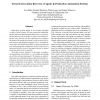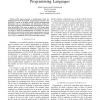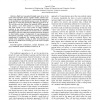IAT
2009
IEEE
14 years 6 months ago
2009
IEEE
—We propose various logical semantics for change of awareness. The setting is that of multiple agents that may become aware of facts or other agents, or forget about them. We mod...
IAT
2009
IEEE
14 years 6 months ago
2009
IEEE
— In this paper, we evaluate a drama management approach deployed in an implementation of a graphical interactive fiction game. Our approach uses players’ feedback as a basis f...
IAT
2009
IEEE
14 years 6 months ago
2009
IEEE
—“Autonomic systems” merge advancements in the field of multi-agent software design, dynamic analysis, and decentralized control in order to assist designers in constructing...
IAT
2009
IEEE
14 years 6 months ago
2009
IEEE
Multi-agent systems (MAS) is an accepted paradigm in safety-critical systems, like the production automation. Agents control the underlying machinery they are representing and int...
IAT
2009
IEEE
14 years 6 months ago
2009
IEEE
Abstract—Social conventions are useful self-sustaining protocols for groups to coordinate behavior without a centralized entity enforcing coordination. We perform an in-depth stu...
IAT
2009
IEEE
14 years 6 months ago
2009
IEEE
This paper introduces an agent-based support model for leadership, which can be used by an ambient system to support a leader in the development of his team member(s). Using model...
IAT
2009
IEEE
14 years 6 months ago
2009
IEEE
—This paper proposes a module-based vision for designing BDI-based multi-agent programming languages. The introduced concept of modules enables common programming techniques such...
IAT
2009
IEEE
14 years 6 months ago
2009
IEEE
Within the field of Criminology, an important challenge is to investigate the spatio-temporal dynamics of crime. Typical questions in this area are how the emergence of criminal h...
IAT
2009
IEEE
14 years 6 months ago
2009
IEEE
—In decentralized settings with partial observability, agents can often benefit from communicating, but communication resources may be limited and costly. Current approaches ten...
IAT
2009
IEEE
14 years 6 months ago
2009
IEEE
—High level conceptual thought seems to be at the basis of the impressive human cognitive ability. Classical topdown (Logic based) and bottom-up (Connectionist) approaches to the...



